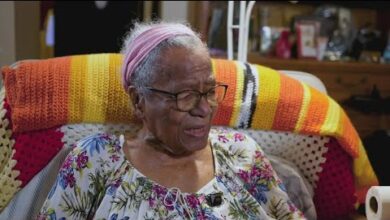Government backs ‘4D tech’ to prevent falls in social care settings

The government has announced that 4D mapping technology, which has the ability to detect falls using sensors and then automatically alert carers, is to be piloted in care homes in England.
It said it would also be funding technologies with the potential to improve support and help people live more independently, including robotic pets and digital voice coaches.
“Scaling up this technology is a vital part of our 10-year vision for social care reform”
Helen Whately
Whzan Guardian, a UK-developed technology, is a monitoring system that uses 4D mapping technology to track people’s movement around the house and detect falls through sensors.
According to the Department of Health and Social Care (DHSC), pilots in several care homes saw a 66% reduction in falls and around a 97.5% reduction in ambulances called or required post fall.
It said the technology would now be rolled out in Redbridge Integrated Care System for further testing, after North East London Integrated Care Board (ICB) received a £1m funding from the Adult Social Care Technology Fund.
If successful, it could be rolled out to more care homes nationally, said the government today.
The Adult Social Care Technology Fund – or Care Tech Fund – was launched in April 2023 as part of the Digitising Social Care programme.
The fund, which is jointly delivered by the DHSC and NHS England, seeks to identify promising technology that has the potential for wider roll-out within the care sector.
The programme invited ICSs, care providers, local authorities and technology suppliers to submit expressions of interest to apply for funding to roll out technology.
Three other successful projects have also been announced today by the DHSC.
Lancashire and South Cumbria ICB will receive £1.2m to develop a medication management system that will monitor dispensing activity of tablet and liquid treatments in real time.
In addition, Bedfordshire, Luton and Milton Keynes ICB will receive £1.1m to develop pain assessment tools and robotic pets to support adults experiencing communication difficulties, as well as adults with dementia, low mood, anxiety and cognitive impairment.
Meanwhile, the London Borough of Barking and Dagenham will receive £1.1m to roll out a range of digital technologies to older people, including video and communication devices, smart home tech and sensors for fall detection.
The Whzan Guardian activity monitoring system was developed with the City of Sunderland to extend care to vulnerable people in their own homes showing signs of frailty and often early-stage dementia.
The Whzan Guardian is a collection of discreet, low-cost wireless sensors that are placed on the wall and connected to wifi, which monitor behaviour and environment according to need.
Evidence of its effectiveness was assessed by studies and evaluations from UCL Partners, North Central London ICB, Leicester and Rutland NHS, Mid and South Essex ICB, City of Sunderland Council.
The Israeli Vayyar 4D technology that would be deployed alongside the Guardian Kit from Whzan Digital Health has been installed across two ICB areas and has been reviewed over eight-month pilots.
The system saved the local authorities and NHS in each area £29,945 and £272,850 respectively, according to the government.
Announcing the funding, minister for social care, Helen Whately, said: “Older and more vulnerable people are at a significant risk of falls.
“Technology plays a crucial role in preventing them, avoiding ambulance callouts and hospital admissions and reducing pressure on the NHS,” she said.
Ms Whately added that the Care Tech Fund had identified technology with “major potential” to improve quality of care while helping people live safely and independently.
“The technology will deliver savings for taxpayers, as falls cost the NHS around £2bn every year,” she said. “Scaling up this technology is a vital part of our 10-year vision for social care reform.
“As the care needs of our population grow, technology will play an increasingly important part in social care that gives people the independence, freedom and security they deserve,” she said.







